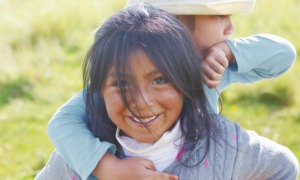
Waraphorn Aphai/Shutterstock
.
The child welfare challenges brought about by the current COVID-19 pandemic have easily been the most disquieting for Maria Calderon, protective services manager at the Carlsbad and Artesia offices of the Children, Youth and Families Department (CYFD).
“In the 18 years that I’ve been here, this is the most stressful time for me,” Calderon said. “From day to day, even from hour to hour. What worries me a lot is the safety of the kids because sometimes we don’t have access to them.”
The Eddy County offices, just like every CYFD location in New Mexico, are scrambling to adhere to organization-wide changes that have been internally mandated and by the state’s high court.
On March 27, the New Mexico Supreme Court, as a public health precaution, suspended all in-person family visits with youth in care for 30 days. Only video or telephone conferencing is allowed through April 26, though the court can extend or modify the order. As a result, CYFD has committed to “over visiting” foster youth with video and phone calls. Statewide child abuse and neglect claims are down overall, which may or may not be a good thing, according to child welfare professionals.
Southeastern New Mexico has especially been dealt a challenging hand over the past month, ranging from a downturn in the oil industry to a March 26 earthquake that flustered on-edge residents of Carlsbad and the surrounding areas. A few days before a 5.0 magnitude tremor struck west Texas approximately 50 miles from Carlsbad, an Eddy County man in his 70s with underlying health conditions died at Artesia General Hospital, becoming the first person in New Mexico to succumb to the coronavirus.
But these crises have also brought out the best in Carlsbad and Artesia community members, who have helped vulnerable kids and families with free internet service as well as donations of money, clothing and supplies.
“We’re still in a very giving community even with the circumstances going on,” Calderon said. “I’m really amazed and I’m in awe.”
Calls are down
Due to the coronavirus scare, the price of oil has plummeted to around $20 a barrel, which has forced some Permian Basin oil field companies into mass layoffs, which includes clerical workers. In a strange twist, Calderon says this has helped with her caseworker vacancies, which she had trouble filling last year.
Calderon says that there have also been fewer calls for referrals, where a claim of child abuse or neglect is investigated. However, the calls that CYFD has received lately are more critical in nature and require law enforcement intervention.
CYFD spokesperson Melody Wells says that this pattern is occurring statewide due to the wholesale closure of New Mexico’s public schools, which governor Michelle Lujan Grisham recently extended through the end of the 2019-2020 school year.
“Public school teachers tend to be the most frequent reporters… seeing a child every day, they notice even small changes in behavior,” she said. “Now kids are at home with the shelter in place.”
Calderon says the calls might also be down because children often won’t report neglect or abuse while a caretaker is present. “What we know from history is that when they do the interviews in the home, it’s unlikely that kids will disclose any type of abuse,” she said.
Currently, there isn’t a consensus that explains why overall calls have been on the decline now that families and children are at home due to COVID-19 pandemic, says CYFD Cabinet Secretary Brian Blalock. “We’ve had this huge intentional push by local communities, local governments and state government to make sure that families have what they need. It may actually mean that our parents are better taken care of,” he said.
“I think it’s interesting that so many people assume that if the children are in the home and with their parents, that that’s going to lead to increased incidences where CYFD should be called, but we don’t really know if that’s true,” Blalock said. “I look forward to reading the academic papers in a few years that looks back at this moment that helps us figure that out because we don’t really know right now.”
Community Gives Back
Because face-to-face contact isn’t allowed, Calderon and her team have had to get creative with home visiting, which now takes place on FaceTime, Zoom video conferencing, tablets or a traditional phone call. Not all families have the luxury of home internet, but Calderon says that PVT NetWorks in Artesia has alleviated technology gaps by giving families with school-aged kids free internet for two months.
[Related: COVID-19 Adds to Woes of Homeless New Mexican Youth Who Age Out of Foster Care]
[Related: Year-old Las Cruces Shelter for Homeless Youth Newly Challenged by Coronavirus]
[Related: Homeless Youth in Northern New Mexico the Focus of 2-Year Project]
[Related: New Mexico Foster Care Intended to Become ‘Trauma Responsive’ in Lawsuit Settlement]
A few weeks ago, utility workers were updating the electrical system at the CYFD office building in Carlsbad, which is undergoing a remodel, and they decided to help in another way. “They saw the work that we do and how hard we’re working and made a donation for us to buy diapers and wipes for foster parents,” Calderon said.
CYFD also works closely with Faith, Hope, and Love Foundation, a Carlsbad community service organization that serves at-risk kids and adults, people experiencing homelessness and other like-minded community service agencies. The nonprofit recently reached out to CYFD and asked how they could specifically support youth in care and foster parents in the face of the coronavirus.
“They’re donating clothing and some money so that we can go out and purchase some items that we might not have,” Calderon said. “The individuals don’t want us to mention their names because they don’t want the attention. They’re donating quite a bit.”
Additionally, a private provider, which also wished to remain anonymous, donated $5,000 to CYFD for foster families. “They’re aware that kids are home and that grocery bills are probably higher. We’re going to divide the money among the families,” Calderon said.
Calderon says that she’s more than thankful that an already giving community has stepped up to aid foster youth and families. It makes her days at CYFD a little less arduous. “We’ve very fortunate. I don’t have to ask for much of anything.”
“Because we don’t brag about the miracles we see every day, people don’t really realize our struggles and the positive things that we do,” Calderon said. “We do really good work. It’s just not out in the public.”
This story is part of a Youth Today project on foster care in New Mexico. It’s made possible in part by the May and Stanley Smith Charitable Trust. Youth Today is solely responsible for the content and maintains editorial independence.





























